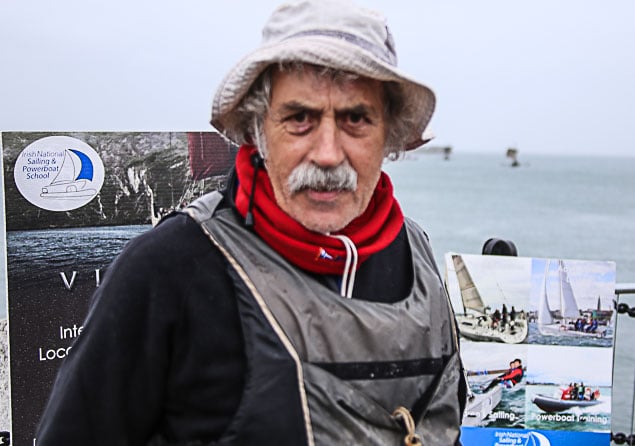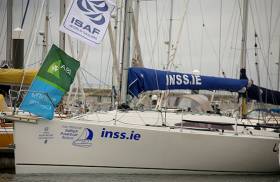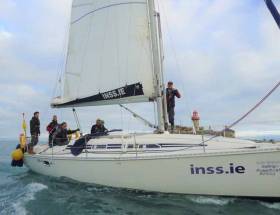Displaying items by tag: Irish National Sailing & Powerboat School
Irish National Sailing & Powerboat School in Dun Laoghaire Launch February Special Offers
With the good weather finally starting to kick in, the team at the Irish National Sailing & Powerboat School are launching a series of special offers for the month of February across adult powerboating and yachting courses.
National Powerboat Certificate – February Bank Holiday Weekend Offer
To celebrate the new February Bank Holiday weekend, the school have a significant price reduction for anyone booking the National Powerboat Certificate course on Saturday 4th and Sunday 5th of February. You can save €100 with the course reduced to €250 per person. The course takes place in various powerboats, from tiller-steered boats, through the school fleet of 40hp and 50hp RIBs and their large 6.5m and 7.5m 150hp RIBs. More Information here
Intermediate Powerboat Course
The February Intermediate Powerboat Course is also discounted. Running on Saturday 18th and Sunday 19th of February, 9.30 am-5 pm each day, participants can avail of a reduced rate of €299, reduced from €370.
This offer is aimed at those needing a little extra encouragement to get back afloat this year. The course takes place in the larger RIB fleet and would call at Poolbeg, Howth, Malahide or Greystones. More Information here
 An Irish National Sailing & Powerboat School Advanced Powerboat Course is running from Friday 10th February (6-9pm), Saturday 11th February (9.30am-9pm) and Sunday 12th February (12-5pm).
An Irish National Sailing & Powerboat School Advanced Powerboat Course is running from Friday 10th February (6-9pm), Saturday 11th February (9.30am-9pm) and Sunday 12th February (12-5pm).
Advanced Powerboat Course
The final deal for powerboat training is for the upcoming Advanced Powerboat Course running Friday 10th February (6-9 pm), Saturday 11th February (9.30 am-9 pm) and Sunday 12th February (12-5 pm). This course is on sale for €325, reduced from €400. More details here
Yachtmaster Theory Course
Always wanted to do your Yachtmaster Theory? Well, here’s a little nudge – with €75 off the course fees!
This course technically isn’t in February, but the team wanted to encourage sailors who’ve put off the training over the pandemic years. The course runs on Saturdays 9.30 am-5 pm, Tuesday evenings 6-9.30 pm and Thursdays 6-9.30 pm in March:
Thursday 2nd, Saturday 4th, Tuesday 7th, Thursday 9th, Saturday 11th, Tuesday 14th, Thursday 16th, Saturday 18th, Tuesday 21st, Thursday 23rd. The assessment will take place on Saturday, 25th March.
Bookings are now open at the reduced price of €450 here
The full schedule of teaching is now underway and the team are looking forward to welcoming new and returning sailors and powerboaters in 2023. The office is also open Monday to Saturday and all are welcome to call up or drop in if they've any questions about any training.
This past Monday (30 March), the Irish National Sailing & Powerboat School launched Sailing School from Home — a series of free short theory lecture videos on topics ranging from kids’ sailing to powerboating, yachting and shore-based programmes.
“We hope that those missing the water can get something from what we’ve got in store, and that they’ll help everyone once we’re all back afloat,” the Dun Laoghaire-based school said in its Facebook post introducing the initiative.
The first in the series, released on Monday, is an introduction to electronic navigation delivered by chief instructor Kenneth Rumball. This was followed yesterday (Wednesday 1 April) by dinghy instructor Fiona Hederman explaining the coming alongside manoeuvre.
Kenneth Rumball has also shared a wide range of his favourite sailing videos to tide you over until the next lesson.
And before the week’s end, the INSS intends to launch a full resource pack on INSS.ie mainly for Junior Club Saturday sailors, detailing the entire theory syllabus of the junior sailing scheme.
INSS Offers Discount For Last Places On Next Week’s Competent Crew Course
#INSS - Owing to a late cancellation, the Irish National Sailing & Powerboat School is overing a discounted rate for two remaining places on its Competent Crew course setting sail next Monday 19 February.
Normally priced at €699, the last two spots are available for only €499 for the five-fay course along the East Coast, paired with the parallel Coastal Skipper Course.
More details on the course can be found HERE, including how to book. But act fast as they won’t be available for long!
Irish National Sailing & Powerboat School to Run Yachting Courses from Malahide in 2018
The Irish National Sailing & Powerboat School will run a series of yachting programmes on a trial basis from Malahide in County Dublin this year. The schedule will include the introductory RYA Start Yachting Course, the 5-day RYA Competent Crew Course and the RYA Day Skipper, for aspiring skippers. Course will run from Malahide Marina, where we are also running a schedule of Irish Sailing Powerboat Programmes.
The expansion from Dun Laoghaire has been facilitated by the recent addition of the Elan 36, Dreamcatcher to the yacht training fleet and builds upon a significant increase in demand for this type of training.
Speaking about the new Malahide base, Alistair Rumball, originally from the area, having started his sailing on the estuary says “It’s a lifetime’s ambition realised. In my teaching opinion, Broad Meadows, the Estuary and the coastal area are most wonderful sailing areas and I’m delighted to be back!”
 Alistair Rumball of the INSS is back in Malahide Photo: Afloat.ie
Alistair Rumball of the INSS is back in Malahide Photo: Afloat.ie
INSS Malahide Sailing Course Information:
- Start Yachting Course
- Competent Crew Course
- Day Skipper Course
- Powerboat Courses
The Irish National Sailing & Powerboat School is Ireland’s largest sailing and powerboat training provider and has operated out of Dun Laoghaire Harbour for 40 years. RYA Cruising Courses, including Start Yachting, Competent Crew, Day Skipper, Coastal Skipper and Yachtmaster are conducted on board the school fleet of training yachts.
In addition to this training, the school runs a busy programme of adult introductory dinghy, yacht and powerboat courses, as well as children’s sailing course throughout school holidays and at weekends during the school year.
For more information: Irish National Sailing & Powerboat School Glyn Williams Ph: 01 2844195 [email protected]


























































